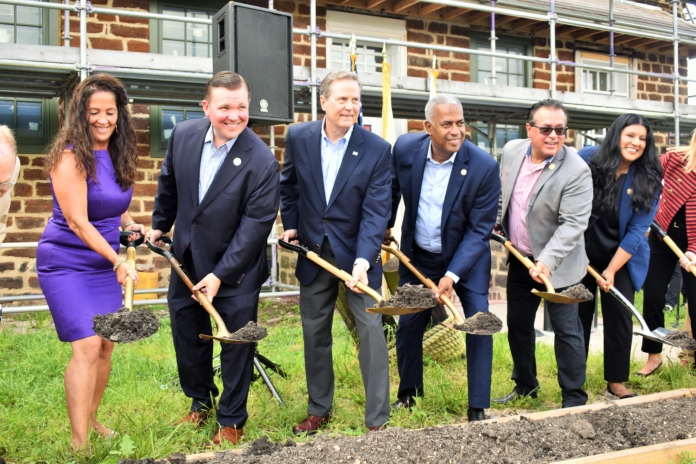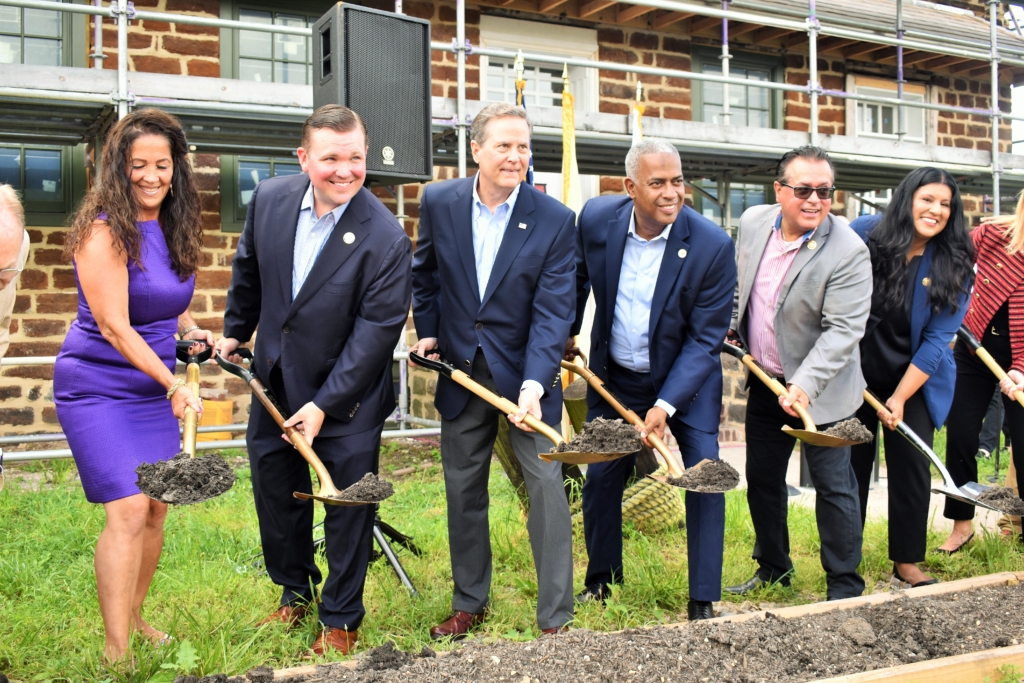

Breaking ground to launch renovations to the historic Benjamin Cooper Tavern on July 7 were Camden Councilwoman Jannette Ramos (left to right), Assemblyman Bill Moen, Congressman Donald Norcross, Camden Mayor Vic Carstarphen, council President Angel Fuentes and Councilwoman Nohemi Soria-Perez.
On a lonely stretch of overgrown ground just north of the Ben Franklin Bridge stands a building built in 1734 that played a major part in the Revolutionary War.
Built by the grandson of Camden’s founder, William Cooper, the Benjamin Cooper Tavern offered food and beverages to people crossing the Delaware River from Philadelphia on the Cooper’s Point Ferry. It continued to serve as an inn, tavern and ferry headquarters, and was the center of many battles in South Jersey during the English army’s Philadelphia Campaign of 1777 and 1778.
“Welcome to North Camden,” the city’s mayor, Vic Carstarphen, said during July 7 groundbreaking ceremonies for a $4-million restoration project to the historic building at 75 Erie Street. “Today we are reclaiming Camden’s story.”
The objective is to transform the building into the American Revolution Museum of Southern New Jersey ahead of America’s 250th birthday next July.
“The Coopers have a long history in Camden,” the mayor noted, “and the city has played a huge role in maritime history. It is great timing to begin this work with the 250th anniversary approaching.”
“This is a great day,” added Councilwoman Jannette Ramos. “We are reclaiming a piece of Camden’s soul. This is a new chapter of preserving and protecting our history.”
“It is so good to be here,” said Congressman Donald Norcross, who helped get a $500,000 grant from the Community Development Fund for the project. “This piece of land is so important. This tavern is about the story of our country.”
“I coached for four years with the North Camden Little League, and passed this building hundreds of times,” relayed state Assemblyman Bill Moen, who was able to obtain a $650,000 state grant to help restore the tavern. “Thanks to the Camden County Historical Society for giving us guidance.”
“We are honored and very excited (about the restoration),” said Jennifer Fleisher, a member of the Camden County Board of Commissioners that awarded a $350,000 grant to help fund the project.
“The Benjamin Cooper Tavern is one of Camden City’s most significant historic sites, so it is imperative that we preserve it for generations to come,” Commissioner Jeffrey Nash said. “This project will keep an important piece of regional history alive and will allow residents and visitors to learn more about the history that surrounds them on a daily basis. We are thrilled to see this project move forward and cannot wait to visit the museum once it is completed.”
“This is the most historic surviving building in Camden,” noted Chris Perks, president of the Camden County Historical Society’s board of directors, who secured a 30-year lease for the property and got a $1.4-million grant from the New Jersey Historic Trust.
Society Executive Director Jack O’Byrne said the organization learned that someone had purchased the 17-acre industrial site the tavern was on and “we were concerned that they may have plans to demolish it. The owner was supportive of our plan to raise money to restore it and create the new museum.”
The building was in terrible shape and there was a 2012 fire that tore through the roof. The temporary roof was put on two years later, so the interior was exposed to the elements all that time, according to O’Byrne.
“It’s amazing that the floors did not collapse and the walls didn’t cave it,” he marveled, adding that the original 1734 building is all there, as well as the 1830 expansion and the 1917 wing. “In February 2024, we started the stabilization of the interior and restoration of the exterior.”
The skirmish at Cooper’s Ferry happened in March of 1778 and the Hessians came and went through there for the Battle of Red Bank. Some 15,000 troops went through during the evacuation of Philadelphia on the way to the skirmish in Haddonfield and the Battle of Monmouth. The New Jersey Militia attacked the British encampment there, and 32 were taken prisoner or killed at the site.
Plans for the museum include displays about the many Revolutionary War battles and skirmishes in South Jersey during the Philadelphia Campaign.
“We’ll finish the exterior masonry and the first-floor interior and open before July 4, 2026,” O’Byrne projected. “When we first did our preservation plan in 2021, the estimate to complete the project was $2.9 million.
“Because of construction increases, inflation, tariffs, etc., the final cost will be closer to $5 million, and we still need to raise $1.5 million more to finish. If we raise the additional funds, we can finish the project by the 250th anniversary of the British occupation of Philadelphia in September 2027, which is the start of our local American Revolution history.”
In the early 19th century, the Benjamin Cooper House served as a pleasure garden and was open to the public in spring and summer. It was the last ferry tavern in Camden and a saloon in its later years that was known as the Old Stone Jug.
In the 21st century, it will become a museum, thanks to a group effort by the Camden County Historical Society and local, county, state and federal agencies, and it will continue its life teaching future generations about U.S. history.
